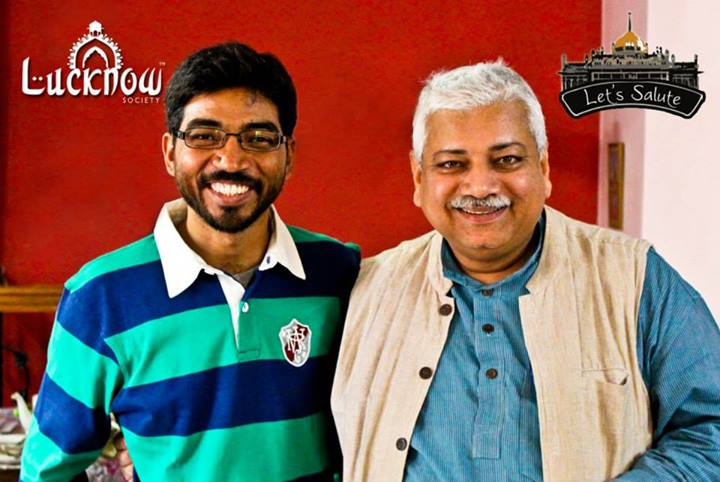Atul Tiwari, born and brought up in the city of Lucknow. At the school itself, he started writing and translating for theatre, though there was no formal creative writing course available in India at that time. After his basic training in theatre from Bharatendu Natya Akademy, Lucknow he graduated from the National School of Drama with specialization in direction. In 1987 he went to The German National Theatre (Weimar) and to the Berliner Ensamble for advance training in theatre direction. Since then, actively writing and directing for theatre, films and television in different parts of India and the world. As a freelancer Atul Tiwari is involved in ideation, creating concepts, writing copies and giving consultaion to many ad agencies, production houses, corporate bodies and even governments. He regularly presents papers at symposia, and teaches theatre, film studies, screenwriting and history at universities and colleges all over the country and abroad, including Trinity College Dublin(Ireland). He has done a lot of hands-on interactive workshops for many groups and educational institutions on theatre and creative writing. Actively associated with, many causes and societies. He is a member of FWA (Film Writer’s Association) and SONG ( Society of NSD Graduates).
In 1986, he had written dialogues for a feature film Yeh who manzil to nahi directed by Sudhir Mishra. In 1989, he shifted base to Mumbai and one of the first things he wrote was for Discovery of India, a film series on Indian history directed by Shyam Banegal, a doyen of Indian cinema. Since then has written screenplays and/or dialogues for a number of feature films for many prominent directors like Eik ghar, Dharavi, Woh chhokri, Drohkaal, Agni varsha, Soch, Chot, Kaash aap hamare hote, Fire, Shaheed udham singh, Mission Kashmir, Dashavtar, Yeh faasley, Netaji subhash Chandra bose – The forgotten hero. Atul’s latest feature film release was Kamal Haasan diretected Vishwaroop in Hindi and Vishwaroopam in Tamil. Atul calls himself ‘a reluctant, accidental actor.’ But he has appeared in several films playing small and big roles. These include some very popular films like 3 Idiots, Akrosh and Vishwaroop/am many others. He has been associated, as a writer and director, with some remarkable works on television. Some of them are Discovery of India, Kab tak pukaroo, Channel mast, Karvat, Kadam, Kashmeer, Mano ya na mano. Atul Tiwari has conceived, created and directed feature length multimedia experiences as installations and traveling productions like Ram se hey Ram tak (on Mahatma Gandhi ), Kachchh, 57 se 47 (on the ‘India’s First war of Independence’ ). He has been associated with many historical-biopic films like Mahatma Gandhi and the Quit India Movement (for Discovery of India), Shaheed Uddham Singh (Feature film), Netaji Subhash Chandra Bose (Feature film), Lal Bahadur Shastri (Short feature for U.P. Govt.), Bhaskaracharya (for Chinmaya Mission), Goswami Tulsidas (for Chinmaya Mission), Adi Guru Shankaracharya (for Chinmaya Mission). He has anchored talk shows, including, one of the pioneering efforts at the genre in India tittled Chakravyuha for Zee TV.
Atul Tiwari presented a paper on the legendary poet Faiz Ahmad Faiz and the city of Lucknow. Faiz, whose revolutionary writings resonated in the pre-independence India from Lahore to Lucknow, visited the city of Nawabs as a young writer to attend the first conference of Progressive Writers Association in Lucknow in 1936. Faiz was immensely impressed by the inaugural address, delivered by Munshi Premchand, and which later the watershed moment that changed the scenario of literature, arts, theater, films and even politics in India. Faiz, who had just turned 25, was young, full of verve,impressive and impressionable. And the stamp or imprint that Lucknow left on him, the bond that this city made with him was the bedrock of a life long relationship. Atul Tiwari had earlier presented this paper during the centenary birth celebration of Faiz Ahmad Faiz in Lahore in 2011. He hailed the such festivals as occasions where younger generation gets opportunity to know about the past legacy. He hails Faiz, like Manto, as a writer beyond boundaries, and said, “He belonged as much to Asia as to Africa, as much to Beirut as to Bangladesh, as much to Pakistan as to India, and belonged as much to Lahore as he belonged to Lucknow.”
Atul Tiwari has been directing plays for theatre from the very beginning of his professional career. He has directed plays for professional repertories, theatre companies, drama schools and for many a theatre groups across the country and abroad in many languages. Apart from the production of Classical and Modern Indian plays, repertoire of more than 30 productions in different languages consisting of Western playwrights like Shakespeare, Schiller, Shaw, Goethe, Brecht and Dario Fo. Some of the classic plays directed by him are Fear & misery of the third reich, Exception & the rule, Macbeth, Caucasian chalk circle, Andhayug, Julius Caesar, The Woman alone, Waking up, Mrichchhakatikam, Turandot, Pygmalion, Khol do, etc. His last big production on stage was Romeo & Juliet in Hindustani, at Prithvi Theatre, Mumbai. His production of Macbeth, with American actors in 1991, at Los Angel’s Theatre Centre (L.A.T.C.) was one of the plays staged to raise money for Shakespeare’s globe centre in London. In India, his theatre work with the villages in the south has been a training ground that has helped him connect with the people at all levels. And his translations – in Hindustani – of more than a dozen plays have brought drama from other languages closer to Hindi speaking audiences. He has translated many plays into Hindustaani from different source languages. Some of them are Three penny opera ( Brecht ), Exception & the rule( Brecht), Caucasian chalk circle ( Brecht), Candida ( Shaw), Dumb waiter ( Pinter), Ubu rex( Alfred Jery), Faust ( Goethe), Turandot ( Schiller), The woman alone (Dario Fo-Franca Rema), Waking up (Dario Fo-Franca Rema, Tempest ( Shakespeare), Macbeth ( Shakespeare), King lear( Shakespeare), Romeo juliet( Shakespeare).
Founder LUCKNOW Society interacted with him recently at our own ‘Lucknow Literary Festival’, where he presented his paper ‘Faiz Ahmed Faiz Ka Lucknow’ and attended many sessions. We Salute Atul Tiwari for being the icon of Ganga-Jamuni Tehzeeb of Lucknow and representing the language as well as culture of Lucknow in media, theatre & bollywood. His contribution and commitment to the cause of theatre and cinema are outstanding. We are looking forward for his next participation in ‘Lucknow Literary Festival’and wishing him very best for his career !

